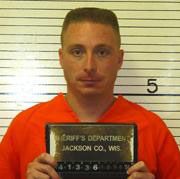By Chuck Remsberg, Police1 Senior Contributor
Part 2 of a 2-part series
In Part 1, we shared the details of a late night off-duty encounter involving former Wisconsin Lt. Matthew Hoskins. It’s the kind of encounter any officer might envision being engaged in…but the conclusion is the kind of thing no officer can imagine.
Here’s the gripping conclusion:
On Monday after the incident, Hoskins was called into his sheriff’s office at the end of his shift. “They shoved a letter at me across the desk,” he says. This was notification that he was being suspended with pay pending investigation of an accusation of “improper conduct,” specifically that he “may have committed a crime” during the off-duty confrontation. He was asked to surrender his badge and gun.
“Afterwards,” Hoskins told Police1, “I sat in my car for 20 minutes, unable to drive. I was stunned, devastated.”
Later that week he was told he would be fired if he didn’t resign. He refused on grounds that he hadn’t done anything wrong. A formal notification that arrived subsequently by certified mail pointed out that Hoskins had “discharged several warning shots” during the midnight encounter. “Warning shots are contrary to the [department’s] policy and…are a highly inappropriate use of deadly force” the county said.
The firing left only his part-time chief’s job for a hamlet in another county to cover his child support and other expenses. He managed to add a similar appointment 7 months later in a neighboring village, but the towns together have scarcely 1,500 population and paid miserly wages. His income plunged from $46,000 a year to $13,000.
The sheriff’s office tried to prevent him from drawing unemployment compensation, arguing that he had been fired for “misconduct.” It was almost winter before a state labor appeals tribunal ruled against the agency. “The fact that [Hoskins] prevented additional bodily injury by using warning shots should be commended-not penalized,” the ruling stated. "[T]here are exceptions when warning shots are appropriate.”
For a year Hoskins carried a copy of the judge’s decision in his pocket to show to people until he wore it out.
More than a year went by. Then on Oct. 8, 2004, a Friday afternoon, hell on earth came visiting.
Hoskins was summoned by urgent phone call to the sheriff’s office in the county where he lives, which is different from the jurisdiction in which he had worked. A warrant had been issued for his arrest for one charge of attempted first-degree intentional homicide and two charges of second-degree reckless endangerment, all felonies.
 |
“They put me in handcuffs,” Hoskins says. “It was right at shift change. I’d worked in that county for 10 years before I took the jail lieutenant’s job in the neighboring county. Everybody there knew me, and everybody saw it.”
Transported to jail in the county where the incident occurred, he was ordered immediately into an orange jumpsuit. “They put me in cuffs, a belly chain, and shackles for the march up to the bond hearing. And that was all before I was even booked-in. “I’d marched so many people to court in chains. Now I was in orange, I was the bad guy.”
Matousek argued successfully for Hoskins’ release on a $25,000 signature bond, though he barely made it to court before Hoskins would have been confined to jail for the weekend if his attorney hadn’t pleaded with the judge for a hearing. The judge said he could still carry a gun when he worked his chiefs’ jobs, but he couldn’t leave the state.
Within 20 minutes of being released from the jail Hoskins received a phone call from two detectives from his home county relayed to him that a major press release had just been sent out by Jackson County. “They released my picture to the press, holding my numbers up.” The next morning his booking photo was on the front page of the news papers, as well as a local TV news crew that had even traveled to one of his small towns interviewing people off the street about their Police Chief being arrested.
Meanwhile, the county in which the incident had occurred and where stories about it had now reached what Hoskins calls “Hollywood proportions” turned the matter over to the State’s Attorney General to bring criminal charges against him. “I told him not to worry, they’ll never charge you,” recalls Attorney Matousek, himself a former prosecutor.
The months that followed were “the worst in my life,” Hoskins says. “I went from being a Boy Scout to being America’s Most Wanted overnight. Everyone used to want to be my friend. Now I was looked at like a scumbag.” People in restaurants held up his picture in the paper and pointed at him. “I couldn’t walk thru Wal-Mart without people coming up and making comments.”
Soon after his arrest he suspended himself under pressure from one of his chief’s jobs and thought it prudent to voluntarily suspend himself from the other. Deputies on his old department, he claims, were ordered not to speak to him. His girlfriend who had clashed with her department in a sick-days dispute left and took a job with the state, moving out of Hoskins’ life and eventually marrying someone else. Through maneuvers by his ex-wife, he lost the privilege of having his little boy, “the passion of my life,” stay overnight with him.
Despite persistent efforts by Matousek, the Attorney General’s Office insisted on pushing ahead toward trial. When Hoskins tried to dig up evidence on his own, another charge was added against him: impersonating a private investigator. If convicted on all counts he could get up to 85 years in prison. The assistant AG assigned to prosecute him said his case would serve as an appropriate warning to other officers.
The ordeal, Hoskins says, “just about killed me. I still dwell on it.”
 |
When the trial began late last June, the prosecutor said at the outset that she didn’t know anything about guns. But she insisted that had the Glock in Hoskins’ hand not “dry fired” it was “almost certain” that the property owner whom the off-duty officer encountered in the dark that night “would not be with us today.”
The defining moment of the trial, however, came when Matousek called as an expert witness Robert Willis, a well-known Wisconsin firearms instructor, former presenter with the Calibre Press Street Survival Seminar and a training consultant with Police1.
Standing in front of the jury box, Willis closely demonstrated to the jurors the mechanical operations of the .40-cal. Glock Model 23. He also patiently explained the few ways in which it can malfunction. By the time he finished he had clearly established why, in his expert opinion, there had not been any misfire (or “dry fire,” as the complainant and the prosecutor consistently termed it) while Hoskins held the gun.
The casings recovered from Hoskins’ three warning shots plus the unblemished live bullets left in the gun constituted a full load. Matousek asserted that the complainant had simply fabricated the alleged attempt to shoot him for dramatic effect. Which Hoskins refers to as the man’s “Hollywood version.” But if he had indeed heard an ominous “click” that night, it was not the hammer falling on an empty chamber or on a dud round, Willis said, but more likely the sound of the trigger resetting itself after Hoskins released his last warning shot.
After a four-day trail the jury deliberated for less than two hours before returning its verdict. Matt Hoskins was acquitted on all counts.
Since then he says he has applied for jobs with 42 LE agencies. No bites. “If there are two candidates, they’re going to go with the least controversial one,” he says. He’s broke now. “My savings are gone. I’ve sold my gun collection. There’s not a friend I don’t owe money to.” Matousek, who was himself once investigated for a crime he didn’t commit, defended him for free, but the bills still pile up. To try to dig out, he got hired by the son of a retired state trooper for a job repairing dishwashers in restaurants and nursing homes.
When we met Hoskins a few days before Christmas, he was wearing his white repairman’s uniform, his nickname stitched on his shirt breast. A small American flag patch was sewn to his left sleeve, an echo of law enforcement days. While we talked, he kept getting messages on his cell phone about a dishwasher that had broken down in Iowa.
“I’m glad to have a job,” he said. “But, you know… my hearts just not in it-it’s embarrassing.
“I worked to be the best cop I could be. I always dreamed I’d have my own department after 20 years, with guys working for me I could trust. I didn’t care if I went to a cat-in-a-tree call, I loved my job.
“I think about all this every day, and every night I lay my head down this is in my mind.
“I tell my cop friends, ‘Don’t get involved if you’re off-duty.’ It hurts me to say that. And if I had that night to live over again, I don’t really know what I’d do now. But I’ll tell you this: It would kill me just to sit in that house.”


